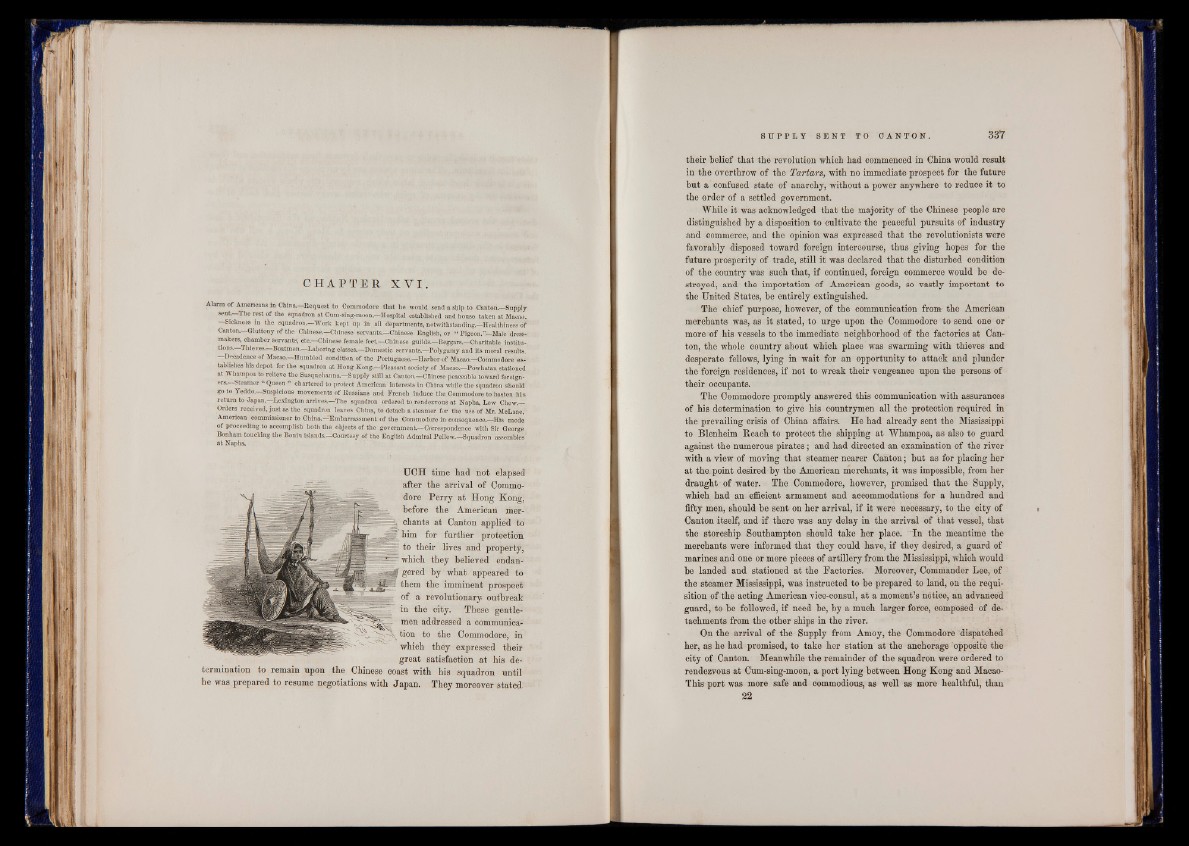
CHAPTER XVI .
Alarm of Americans in China.—Request to Commodore that he would send a ship to Canton.—Supply
sent—The rest of the squadron at Cum-sing-moon.—Hospital established and house taken a t Macao.
—Sickness in the squadron.—"Work kept up in all departments, notwithstanding.—Healthiness of
Canton. Gluttony of the Chinese.—Chinese servants.—Chinese English, or “ Pigeon.”—Male dressmakers,
chamber servants, etc.—Chinese female feet—Chinese guilds.—Beggars.—Charitable institutions.—
Thieves.—Boatmen.—Laboring classes.—Domestic servants.—Polygamy and its moral results,
—Decadence of Macao.—Humbled condition of the Portuguese.—Harbor of Macao.—Commodore establishes
his depot for the squadron at Hong Kong.—Pleasant society of Macao.—Powhatan stationed
at Whampoa to relieve the Susquehanna.—Supply still at Canton.—Chinese peaceable toward foreigners.—
Steamer “ Queen ” chartered to protect American interests in China while the squadron should
go to Yeddo.—Suspicious movements of Russians and French induce the Commodore to hasten his
return to Japan. L e x i n g t o n arrives.—The squadron ordered to rendezvous a t Kapha, Lew Chew.—
Orders received, just as the squadron leaves China, to detach a steamer for the use of Mr. MoLane,
American commissioner to China.—Embarrassment of the Commodore in consequence.—His mode
of proceeding to accomplish both the objects of the government.—Correspondence with Sir George
Bonham touching the Bonin islands.—Courtesy of the English Admiral Pellew.—Squadron assembles'
a t Kapha.
UOH time had not elapsed
after the arrival of Commodore
P e rrj at Hong Kong,
before the American merchants
at Canton applied to
him for further protection
to their lives and property,
which they believed endangered
by what appeared to
them the imminent prospect
of a revolutionary outbreak
in the city. These gentlemen
addressed a communication
to the Commodore, in
which they expressed their
great satisfaction at his determination
to remain upon the Chinese coast with his squadron until
he was prepared to resume negotiations with Japan. They moreover stated
their belief that the revolution which had commenced in China would result
in the overthrow of the Tartars, with no immediate prospeet for the future
hut a confused state of anarchy, without a power anywhere to reduce it to
the order of a settled government.
While it was acknowledged that the majority of the Chinese people are
distinguished by a disposition to cultivate the peaceful pursuits of industry
and commerce, and the opinion was expressed that the revolutionists were
favorably disposed toward foreign intercourse, thus giving hopes for the
future prosperity of trade, still it was declared that the disturbed condition
of the country was such that, if continued, foreign commerce would be destroyed,
and the importation of American goods, so vastly important to
the United States, be entirely extinguished.
The chief purpose, however, of the communication from the American
merchants was, as it stated, to urge upon the Commodore to send one or
more of his vessels to the immediate neighborhood of the factories at Canton,
the whole country about which place was swarming with thieves and
desperate fellows, lying in wait for an opportunity to attack and plunder
the foreign residences, if not to wreak their vengeance upon the persons of
their occupants.
The Commodore promptly answered this communication with assurances
of his determination to give his countrymen all the protection required in
the prevailing crisis of China affairs. He had already sent the Mississippi
to Blenheim Reach to protect the shipping at Whampoa, as also to guard
against the numerous pirates; and had directed an examination of the river
with a view of moving that steamer nearer Canton; but as for placing her
at the. point desired by the American merchants, it was impossible, from her
draught of water. The Commodore, however, promised that the Supply,
which had an efficient armament and accommodations for a hundred and
fifty men, should be sent on her arrival, if it were necessary, to the city of
Canton itself, and if there was any delay in the arrival of that vessel, that
the storeship Southampton should take her place. "In the meantime the
merchants were informed that they could have, if they desired, a guard of
marines and one or more pieces of artillery from the Mississippi, which would
be landed and stationed at the Factories. Moreover, Commander Lee, of
the steamer Mississippi, was instructed to be prepared to land, on the requisition
of the acting American vice-consul, at a moment’s notice, an advanced
guard, to be followed, if need be, by a much larger force, composed of detachments
from the other ships in the river.
On the arrival of the Supply from Amoy, the Commodore dispatched
her, as he had promised, to take her station at the anchorage opposite the
city of Canton. Meanwhile the remainder of the squadron were ordered to
rendezvous at Cum-sing-moon, a port lying between Hong Kong and Macao-
This port was more safe and commodious, as well as more healthful, than
22